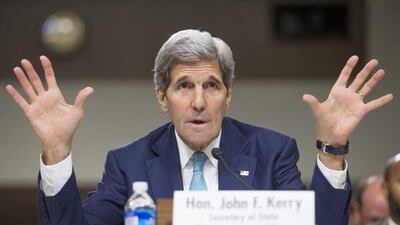NEW YORK // The Obama administration’s all-out lobbying effort to convince sceptical lawmakers to support the Iran nuclear deal ahead of a likely congressional vote in September faced an uphill battle on Thursday.
As US secretary of state John Kerry was grilled by members of the senate foreign relations committee, committee chairman Bob Corker made his disdain for the agreement very clear.
“I’m sorry to say this, but I believe you’ve been fleeced,” he told Mr Kerry in the first public debate between congress and the administration over the deal. “I believe that you have crossed a new threshold in US foreign policy” by enabling a “state sponsor of terrorism” to become a nuclear power.
The Republican senator raised a host of concerns shared by other Republican lawmakers, including whether the inspections provisions in the historic agreement signed by Iran and US-led world powers earlier this month were strong enough to prevent Tehran from cheating. He also asked why Iran, which he said has no legitimate need for a civilian nuclear programme, was allowed to have any enrichment capabilities.
The eventual lifting of the ballistic missile and conventional arms embargo was also “unbelievable”, Mr Corker said.
Mr Kerry countered that no amount of sanctions or even military action could erase Iran’s knowledge of how to enrich uranium, and that the deal struck in Vienna puts in place an unprecedented inspections regime that will catch Tehran if it violates the deal, and significantly rolls back its capabilities for the next decade.
If congress rejects the agreement now, it would be “a great big green light for Iran to double the pace of its uranium enrichment, proceed full speed ahead with a heavy water reactor, install new and more efficient centrifuges, and do it all without the unprecedented inspection and transparency measures that we have secured,” he said. “Everything we have prevented would then start taking place.”
Congress now has 60 days to review the agreement, and can choose to vote on whether to approve or disapprove the deal. A vote against the deal could – in theory – prevent US sanctions against Iran from being lifted in accordance with the agreement.
President Barack Obama has vowed to veto any bill on the deal, although congress could override a veto if it can muster a two-thirds majority. And so, with a Republican-majority congress, all attention has turned to the Democrats who would provide the swing vote in any veto overriding attempt.
Democratic lawmakers have offered cautious support but have refused to publicly say whether they will support the deal.
The ranking Democratic member of the senate foreign relations committee, Benjamin Cardin said on Thursday that the final accord was in many ways more stringent than the framework deal agreed to in April.
Other Democrats defended Mr Kerry from the Republican attacks.
However, it seems unlikely that all can be convinced. Staunchly pro-Israel senator Bob Menendez, who sits on the committee, barely looked up from using his smartphone during Mr Kerry’s testimony.
Private lobby groups are also stepping up their efforts in key states where Democratic representatives who are on the fence will meet constituents during the August recess.
The pro-Israel AIPAC lobbying group is reportedly spending US$40 million (Dh146.9m) on advertisements against the deal, while JStreet, a liberal pro-Israel lobbying group, is planning to bring former Israeli military officials and political figures to the US to voice support for the deal and explain how they think it makes the Jewish state safer.
Thousands of pro-Israel demonstrators gathered in New York’s Times Square on Wednesday evening at a rally opposing the deal. “Kill the deal!” the crowd chanted at one point.
Israeli prime minister Benjamin Netanyahu is the most vocal opponent of the deal and will be pushing back against the White House with his own lobbying effort in Washington to convince members of congress.
The White House has tried to counter Mr Netanyahu’s opposition by holding up the Arabian Gulf states as US allies in the region who support the deal.
“The Emiratis are supportive,” Mr Kerry said, adding that Saudi Arabia’s foreign minister, Adel Al Jubeir, said that the Iran deal has all the provisions needed to prevent Tehran from building a nuclear weapon.
The US has “extensive plans” for countering Iran’s regional activities and bolstering its Gulf partners’ capabilities, Mr Kerry said on Thursday. He will meet GCC foreign ministers in Doha on August 3 to discuss these plans and address concerns about the deal.
However, while publicly supportive, many Arab officials from allied countries are still sceptical that the White House has a strategy in place to counter Iran.
“Sometimes it’s difficult for us to know what the US strategy is,” a Jordanian general, Mashal Al Zaben, was overheard by reporters saying to US defence secretary Ashton Carter in Amman on Wednesday. “What’s going on?”
tkhan@thenational.ae
* With additional reporting by Bloomberg

